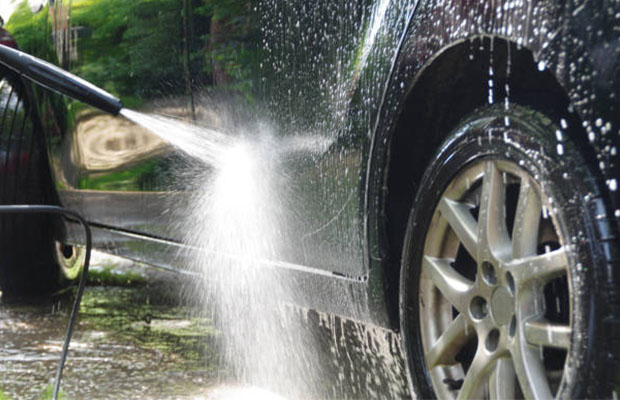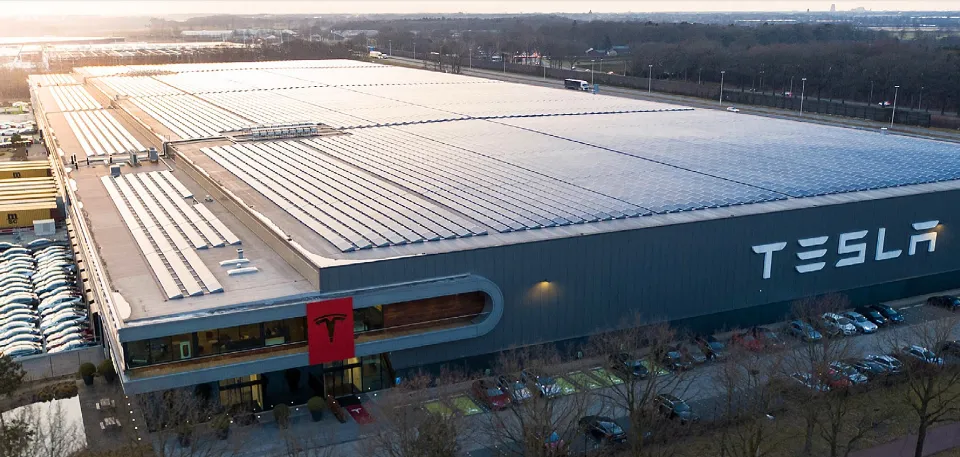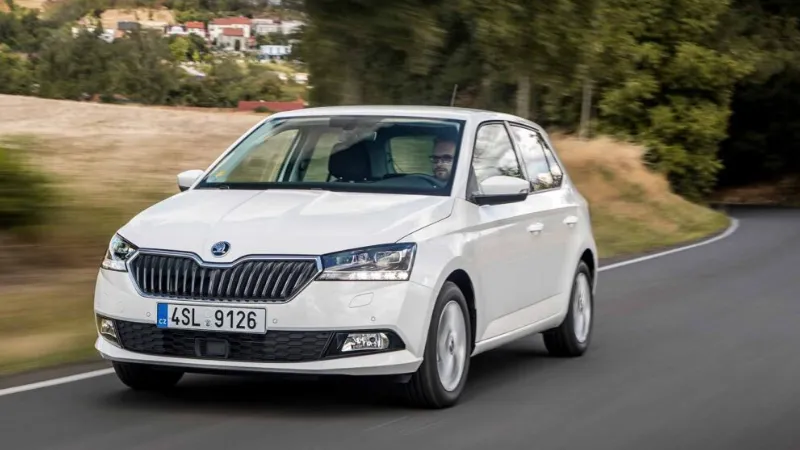Pressure washers come in a range of sizes, from compact handheld models to larger ones that need to be mounted on a truck. There are many different pressure washer types, from gas to electric to industrial strength, and what works for one household may be overkill for another. Therefore, how do you choose the best car pressure washer?
The best car pressure washer should be sturdy, durable, easy to use, and feature a variety of settings to choose from. Especially if you want to use it to detail your classic car or if you have more than one vehicle, it should be adaptable to accommodate a variety of car types.
This list was created to help you find the best options for your needs and financial situation, as well as to explain what to look for when buying a pressure washer.
You May Also Like: Best Vehicles To Live In
Best Car Pressure Washer: Top Pick
1. Sun Joe Pressure Washer
2. Portland 1750 PSI 1.3 GPM Corded Electric Pressure Washer
3. Worx WG630.2 Hydroshot Pressure Washer
4. Karcher K1700 Electric Pressure Washer
5. WEN PW31 Gas Pressure Washer
6. Annovi Reverberi AR Blue Clean AR383SS
7. Stanley SHP1600 Electric Pressure Washer
8. Stanley SHP2150
9. Generac Speedwash 6882 Pressure Washer
10. Greenworks GPW2000-1RG
Best Car Pressure Washer Review
1. Sun Joe Pressure Washer
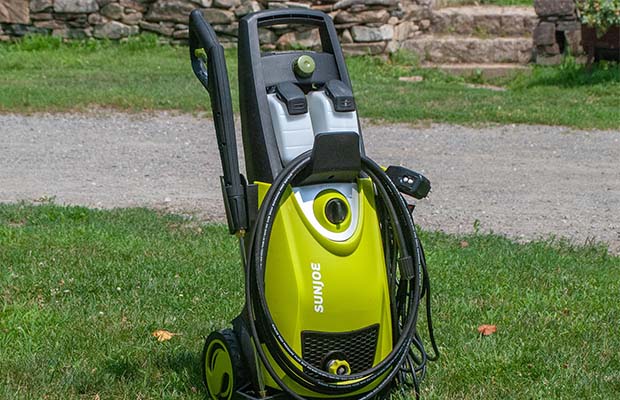
This is one of the best car pressure washer. The Sun Joe SPX 3001 is widely regarded as the best electric pressure washer because of its sufficient power, quiet operation, light weight, reasonable price, and included accessories. It has over 10,000 reviews and a respectable 88% positive rating on Amazon. Its 14.5 amp/1,800 watt motor produces 2,030 PSI (pounds per square inch) of pressure along with a respectable 1.76 GPM (gallons per minute) of water flow, which is sufficient for the majority of common household tasks, including washing siding, decks, fences, patios, and more.
The five quick connect nozzles (0, 15, 25, 40, and soap) give you a range of pressures for harder jobs and wider spreads for delicate work like washing your car. You have more than 50 feet of range from the closest outlet thanks to the 35-foot power cord and 20-foot hose, and the plug has GFCI protection so you won’t accidentally cause a short circuit.
- Pros: Multiple tips included, onboard soap tank, quiet with auto shutoff, big wheels work well on rough surfaces
- Cons: Stiff hose reel, needs better cord storage, barely enough pressure for foam guns
2. Portland 1750 Psi 1.3 Gpm Corded Electric Pressure Washer
This Portland pressure washer is a great option if you don’t need a pressure washer for anything more demanding than washing your car, cleaning your fence, and maintaining a wooden deck, and you don’t want to spend too much money on something that will most likely sit in the garage. It is portable and simple to use, has a low-pressure detergent bottle attachment that is ideal for washing cars and has just the right pressure for the job. However, it lacks specialized tips and instead only has an adjustable nozzle.
The Portland power washer is a simple device in comparison to some more expensive electric pressure washers. But in many locations, you can purchase your own for less than it would cost to rent one for a day. Additionally, the lower 1.3 gallons per minute flow rate and lower pressure are excellent features for both protecting automotive finishes and water conservation.
This pressure washer checks off most of the boxes, including being extremely inexpensive, having the ideal pressure for cleaning cars, and receiving favorable reviews.
- Pros: Very affordable, lightweight, perfect for car cleaning
- Cons: Less powerful, single adjustable nozzle, short 20-foot hose
3. Worx Wg630.2 Hydroshot Pressure Washer
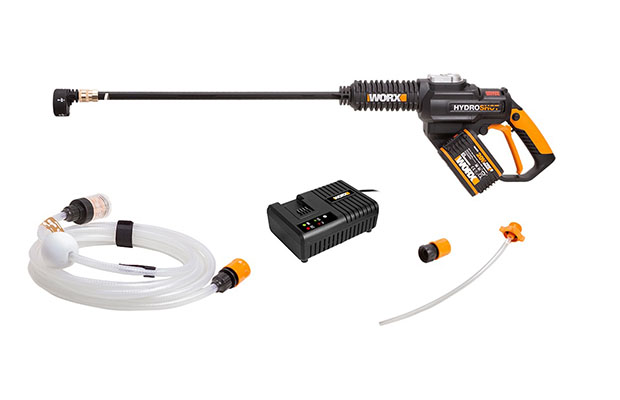
Worx has introduced a line of cordless 20-volt pressure washers if the idea of even a smaller pressure washer, like the Sun Joe and Portland, still seems like too much work to lug around. Even though it only has 350 PSI, it’s more powerful than a garden hose and won’t risk destroying your paint. It’s not a true pressure washer, though. More effectively than using the hose alone, it can blast grime and dirt off the surface of your car. It has a single variable nozzle with five spray angles and can be used with a garden hose or a bucket of water or another open water source, such as a lake.
The Worx has a great feature that makes it one of the best power washers for cars: a kit of attachments that are ideal for washing every part of cars, trucks, and SUVs. You receive a soap bottle and additional items, allowing you to complete almost all of your washing with the tool alone.
It has a shower setting for watering plants, so if you use it connected to your garden hose, you won’t need to unplug it to water your lawn or garden.
- Pros: Works anywhere, lightweight and truly portable, multiple settings, very compact for easy storage
- Cons: Not very powerful, expensive for lower pressure
4. Karcher K1700 Electric Pressure Washer
The Karcher K1700 is another best option for middle-pressure range electric power. The Karcher, which as its name suggests produces 1,700 PSI, is designed for convenience. It has large wheels for easy mobility, a removable bucket that serves as hose storage, and a detachable half-gallon soap tank. Although the K1700 lacks a hose reel, it also has a convenient foot-operated on/off switch, and the power cord storage is located at the very top of the handle so you don’t have to stoop down to tuck it away neatly. Even though there are only three nozzles, they are the most useful ones: a turbo nozzle for concentrated cleaning power, an all-purpose 15-degree nozzle, and one for applying soap.
While many companies only provide a one-year warranty, Karcher offers a three-year limited warranty and a rapid exchange program in case you run into any warranty-related problems. Concerns include the short hose and reports of a broken soap dispenser.
If you like this model but desire more power, Karcher offers additional models up to 2,000 PSI, including a small 1,700 PSI Cube that sacrifices capacity for a small design.
- Pros: Removable bucket that doubles as convenient storage, compact size good for storage, onboard detergent tank, best seller, 3-year warranty
- Cons: Shorter 20-foot hose, some users report leaking, malfunctioning soap dispenser, not very powerful, just three nozzles
5. Wen Pw31 Gas Pressure Washer
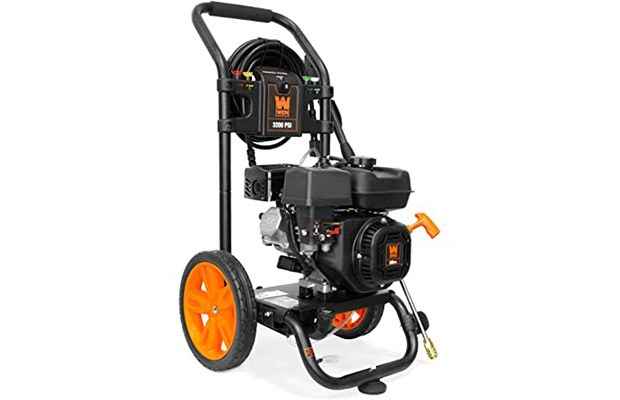
This Wen PW31 is a well-liked choice with excellent user ratings if you want a powerful gas-powered washer. The 208 CC four-stroke engine (no mixing is necessary!) produces 2.5 GPM at 3,100 PSI, with a quick-change nozzle for the five different tips (0°, 15°, 25°, and soap), built-in storage, a soap dispenser, and an onboard soap tank. With its large wheels and 30-foot hose, you can move it around the yard with ease once you start spraying.
Wen backs up their products with a reliable two-year warranty, and both this 3,100 PSI model and a 2,800 PSI model have excellent ratings and user reviews. However, as with any gas-powered model, it needs special care during storage and must be topped off as needed with gas and 30W four-stroke engine oil. While the Wen has the convenience of a four-stroke engine, some owners claim that it uses up its gas quickly. You will also need to change the oil at least once per year, despite Wen’s quick gas consumption.
- Pros: Powerful, easy to start, two-year warranty
- Cons: Higher price, small fuel tank, loud, storing and maintaining gas
6. Annovi Reverberi Ar Blue Clean Ar383ss
Italian pressure washing experts Annovi Reverberi may be unknown to you, but they have been in operation for over 50 years. Their AR Blue Clean frequently appears on lists of the best pressure washers, particularly for cleaning cars, and they manufacture both residential and commercial electric pressure washers. Although some users claim that the pressure did not live up to expectations for a 1,900 PSI machine, the AR Blue Clean AR383SS is rated at 1,900 PSI and has a 1.5hp motor, so it has plenty of power for cleaning your car and probably any household tasks as well. With a 35-foot power cord and an additional 30-foot high-pressure hose, the AR Blue Clean AR383SS has a longer reach than many of its rivals. Depending on your garden hose, you should be able to set up over 60 feet from the closest outlet.
- Pros: One-year warranty, quick change tips, quick connect hose adapter, clear assembly instructions, quiet operation
- Cons: Inconsistent pressure, occasional leakage, and DOA units
7. Stanley Shp1600 Electric Pressure Washer
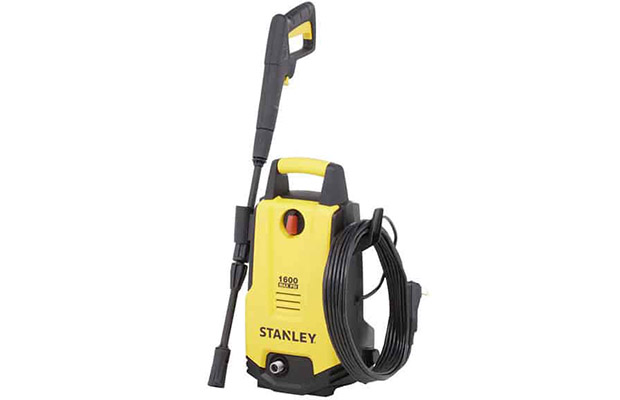
A 1,600 PSI pressure washer is the best if that will be your primary use for it because professional detailers advise you to keep pressure well under 2,000 PSI for washing your car. The electric Stanley SHP1600 has a 35-foot power cord, GFCI plug, and a 20-foot hose, giving it a range of more than 50 feet. Its short wand makes it simple to control, but it also has an extension for when you need more reach. The SHP1600 has an adjustable nozzle rather than separate tips, allowing you to start with a nice wide-angle soft spray for the pre-soak, attach the detergent bottle for the soap stage, and then close the nozzle for the high-pressure rinse, just like you would at a coin-op car wash in the convenience of your driveway. The soap tank’s capacity is 14 ounces due to the model’s smaller size.
It weighs only 16 pounds and is a lower-pressure model, so even without wheels, it should be manageable to move around.
- Pros: Compact and portable, variable nozzle, two-year warranty
- Cons: Cord is short, basic power, no hose reel or wheels
This guide will go over how to wash a car at home and some frequently asked questions about best practices for washing cars in order to assist you in keeping your car clean.
8. Stanley Shp2150
2,150.0 pounds per square inch (PSI) and 1.4 gallons per minute (GPM) are the pressure washing capacities of the Stanley SHP2150. With a 13.0-amp motor and a detergent bottle that serves as both a high-pressure foamer and a detergent for the best cleaning results, this pressure washer will outperform a car wash.
This pressure washer has a telescoping handle and a number of accessories, including a pressure washer gun, a pressure washer wand, and a 25-foot hose. pressure hose, a foam cannon, four removable quick-connect nozzles, and an o-ring replacement kit. This pressure washer won’t leak thanks to a garden hose connector made of professional-grade brass. The fact that this product has a two-year warranty should also be mentioned.
- Pros: Telescoping handle, a variety of accessories, and a two-year warranty are included.
- Cons: The product’s longevity is not good, the Stanley didn’t hold up under heavy use for some people
9. Generac Speedwash 6882 Pressure Washer
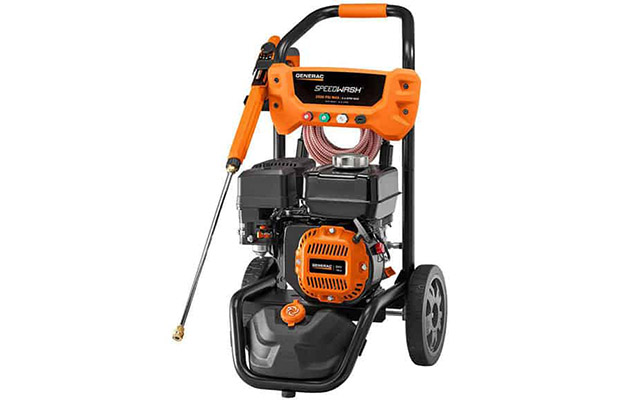
If you have a truck that gets REALLY dirty or needs a stronger washer for other household tasks, you might want to move straight to a gas engine model with higher pressure so you don’t need to own different pressure washers for various jobs. The five-star reviews of Generac’s Speedwash 6882 demonstrate that the company produces some of the best gas-powered pressure washers available. If you’re not careful, it has enough cleaning power to strip your car down to its bare metal at 2.9 gallons per minute at 2,900 PSI. Thankfully, it has a pressure wand that can be adjusted with a “Car” setting.
One advantage of a gas pressure washer is that you don’t have to be concerned about your electrical cord. It comes with the standard four tips, including a soap sprayer, a 25-foot hose, and a half-gallon soap tank. As a pressure washer intended for multiple uses, you also get a rotating wet Turbo Broom for deep cleaning walkways and other surfaces
- Pros: Powerful, USA-made, three-year warranty, pressure adjustment
- Cons: Can easily remove paint, gas engine maintenance
10. Greenworks Gpw2000-1rg
Only one pressure washer, the Greenworks GPW2000-1RG, has been evaluated and tested in accordance with the Pressure Washer Manufacturers’ Association (PWMA). Thanks to its potent 13.0-amp motor, this pressure washer can produce 2,000.0 PSI and 1.1 GPM. Regardless of the purpose for which they are used, pressure washers must adhere to standards established by the PWMA, which was established in 1997.
Due to its start/stop technology, the pressure washer is push-to-start and automatically disengages when not in use. Thanks to a 20.0-foot hose and a 35.0-foot power cord, you can move this pressure washer around with ease.
- Pros: Soap siphon hose allows users to easily switch between pressure washing to using cleaning detergents, small size
- Cons: Not easy to use
What Is A Pressure Washer?
A pressure washer is a common household item that connects to your garden hose and significantly increases the force of the water spray in order to be able to remove stubborn stains and dirt. The functional part is typically a spray gun or wand, and they frequently come with a variety of attachments for various cleaning jobs, from soap dispensers to power brushes. Pressure washers can be divided into a number of groups according to their strength and power source. The two primary types of pressure washers are gas and electric, and these two power sources also affect how much force they can produce.

How To Use A Pressure Washer?
Withstanding years of exposure to rock chips, salt, sand, dust, and water blasted at them from the side of the road at 65 MPH, modern basecoat-clearcoat automotive finishes are incredibly resilient. However, none of that technology can withstand 2,000 PSI or more coming from a close distance. Leaning in to remove a stubborn patch of tar might be alluring, but doing so will probably start scraping paint off as well.
It makes sense to heed their advice because many professional detailers do use pressure washers. For cleaning your car, a professional detailer advises using no more than 1,500 PSI and never using extremely narrow 0º nozzles. This can quickly reduce you to bare metal and functions essentially as a water-cutting jet. The safest way to do it is to use a wider 25° or 40° degree nozzle and always keep the tip at least 18 inches from the car—further away the greater the pressure—as we are not aware of many pressure washers with pressure adjustment (although the Generac has one). If something comes off, you will simply need to use cleaning supplies and manual labor. You cannot treat your wheels any differently just because they are made of metal. Additionally, a lot of wheels have paint or clear coating.
Additionally, pressure washing poses a risk.
- Pressure washers have a powerful spray that can result in serious injuries even though they initially seem minor. A person who delays treatment for wounds that seem minor increases their risk of infection, disability, or amputation.
- The quick, powerful spray can hurl things that hit and hurt people nearby.
- If the pressure washer is not used correctly and safety precautions are not followed, an electric shock may result.
- Carbon monoxide poisoning can result from the use of small gasoline engines. Unless the gasoline engine can be installed outdoors and away from air intakes, workers should not use any equipment powered by gasoline engines inside buildings or other partially enclosed spaces.
A high-pressure unit with a 0º nozzle could also cause you a pressure injection injury, though it’s uncommon with a household pressure washer. So be respectful of your pressure washer.
Interestingly, many municipalities have rules regarding the discharge and runoff from pressure washing, and even though these regulations typically do not apply to individuals who wash their own vehicles, you might look into it before you receive a fine.
Why Is Pressure Washer Necessary For Car Cleaning?
The effortless removal of dirt from your prized deck or patio by a stream of concentrated water is one of life’s greatest pleasures; who would want to scrub the entire deck clean?
The numerous large surfaces in your yard that can withstand pressure can be cleaned with a pressure washer, especially wooden fences and decks, concrete driveways, flagstone patios, windows, and the siding on your home. Additionally, while you might be tempted to simply hose down your gardening tools with a regular hose to clean them, a pressure washer gets them incredibly clean, just as it would for some outdoor furniture. However, you should exercise caution when using the pressure washer on anything delicate like fabric or wicker. It removes all of the flaking paint, making it a great first step before sanding if you intend to paint exterior trim.
In light of this warning, a pressure washer can be a useful time and energy saver; most typical residential units use significantly less water than a standard garden hose, so you are also conserving water.
When it comes to washing cars, it also beats hand-scrubbing every inch of the vehicle, including the wheels and wheel wells, especially for off-roaders returning from muddy excursions or messy construction sites. A regular garden hose simply won’t remove the really caked-on dirt and built-up grime. For use with the pressure washer, be sure to purchase a suitable car wash soap. Most come with wand attachments or soap dispensers that are already built in. Also, take into account accessories that use water pressure to power soft-cloth brushes to advance the situation.

Buyers Guide For Best Car Pressure Washer
There are numerous pressure washer brands and model options to choose from for cars. Your purchasing process will go more smoothly if you know what kind of pressure washer you want and which replaceable nozzle options are offered.
Types Of Pressure Washers
There are two main categories of pressure washers: electric and gas. You can choose a pressure washer that best suits your needs by understanding the advantages and disadvantages of each type available.
- Electric pressure washers: This particular pressure washer has a push-to-start button and operates more quietly and thoroughly than its rival. Although some gas-powered models of pressure washers can deliver higher power ranges, most light to heavy-duty jobs can be successfully completed with electric pressure washers.
- Gas pressure washers: Pressure washers of this kind typically have a manual pull start and have the strength and mobility needed to handle heavy-duty jobs. Gas pressure washers may even be able to remove paint, depending on the model.
Different Nozzle Types
In addition to a set of interchangeable nozzles, pressure washers also come with an all-in-one variable spray wand that lets you change the water pressure. You can determine which nozzles you’ll need for your pressure washer by understanding the intended application of each type of nozzle.
- 0 degrees: This is the setting for the nozzle that is the strongest and most concentrated.
- 15 degrees: This nozzle was designed for thorough cleaning.
- 25 degrees: This type of nozzle is designed for all-purpose cleaning.
- 40 degrees: This nozzle is intended for use on vehicles, patio furniture, boats, and other easily damaged surfaces.
- 65 degrees: This kind of low-pressure nozzle is used to apply soap and other cleaning agents.
The Bottom Line: Best Car Pressure Washer
Nothing beats the satisfaction of a spotlessly clean car. Electric models offer the best performance at the most reasonable cost when it comes to finding the best pressure washer for your car. A lot more so in comparison to gas washers, which are frequently more powerful but better suited for industrial tasks.
Although there are many other excellent choices available, the aforementioned are my favorites. As with any purchase, it’s crucial to conduct research to make sure it will fulfill your needs and expectations.
Also Read: Best Car Wash Soap For Black Cars

